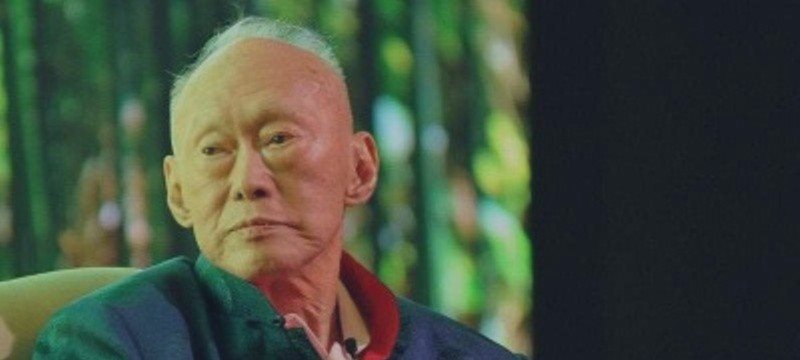Seldom has the death of a great Asian leader commanded as much appreciation in the West as the passing of Lee Kuan Yew. The mind numbs at the number of well-earned tributes to the man who led Singapore to become a successful and influential nation-state.
Despite the huge disparity in size and political-legal culture between Singapore and mainland China, many observers have emphasised the seductive attraction that ‘the Singapore model’ has held for Chinese communist leaders who are searching for a formula that will enhance China’s phenomenal economic development without sacrificing the Party’s dictatorial control.
Other writers have featured Lee’s intellectual brilliance, self-confident personality and deep understanding of world politics, which he freely dispensed to political leaders of various countries eager to bridge the gap between East and West.
A few early post-mortems have even transcended the natural tendency, in the wake of his departure, to minimise the costs of Lee’s accomplishments, especially his authoritarian policies and practices.
This essay will provide a bit of grist for the historian’s mill by offering an account of some fragmentary personal contacts that I had with Lee a generation or two ago.
It all started with Richard Nixon’s election to the American presidency in early November 1968. Immediately afterward, Lee turned up at Harvard University, invited by the newly established Kennedy Institute of Politics, not for the usual photo-op preferred by most world leaders but for a residence of over a month. While a law school professor, I had chaired the Institute’s just-completed confidential study of the need for a new American policy toward China and so Institute director Richard Neustadt asked me to share some of the responsibilities for hosting Singapore’s prime minister.
We knew that Lee, who had an outstanding record when a law student at Cambridge in England, had not come to us for an academic sabbatical that would merely recharge his powerful batteries. He made it clear at the outset that he was with us for work and that his work was to understand the forces that were then roiling America’s volatile society, so that he might better chart Singapore’s course.
Earlier than most statesmen, he sensed that the United States, then wracked by the Vietnam War, was on the verge of changing its Asia policy — especially its relations with China, despite the ongoing madness of the Cultural Revolution. A year prior to his election, Nixon — although the arch anti-Communist — had hinted at the need for a more open approach to Beijing, if only to better balance Soviet power. Lee had decided that, by staying in one place in America, studying the media and tapping the ideas of the Boston-area foreign policy and political community, he could best anticipate Washington’s new direction.
Lee did work hard at Harvard. He did not seek to make many speeches but took advantage of every occasion to learn. I invited him to give a lunch seminar to law students interested in Asia and we had a frank, relaxed conversation that covered both Asian affairs and American politics. Lee asked as many questions as he answered and showed none of the arrogance of which he had already been accused.
I liked him. And so my wife —Joan Lebold Cohen, a specialist in Asian art — and I asked him to dinner at our house with a few of our Harvard colleagues. Again, the conversation was lively, informative and friendly. Perhaps because we were new to diplomatic entertaining, we had found it unusual to receive advance written instructions from Lee’s staff that there should be no smoking in the prime minister’s presence, that the room should be set at a particular temperature and that certain foods should not be served. But it was a convivial evening.
The following summer, in 1969, Joan and I visited Singapore briefly as part of an Asian research tour. Prime Minister Lee proved a thoughtful host. He reciprocated our hospitality by inviting us for a small roundtable dinner with Singapore’s legal elite, including the attorney general, the minister for law, the solicitor general, one or two law professors and his wife — herself a leading lawyer.
Several topics dominated the conversation. Knowing that I was advising Senator Edward Kennedy, who despite his youth was already expected to contest Nixon’s re-election three years hence, we discussed American political developments since Lee had returned from Harvard. Lee, who during his stay had been disturbed by the university’s anti-Vietnam war, anti-government atmosphere, expressed anxiety about the wisdom (or lack thereof) and influence of America’s youth. After his return, Lee began requiring long-haired young Westerners who turned up at Singapore’s airport to submit to haircuts before entering the country. He wanted to limit the risk of contagion among their local counterparts!
Despite the huge disparity in size and political-legal culture between Singapore and mainland China, many observers have emphasised the seductive attraction that ‘the Singapore model’ has held for Chinese communist leaders who are searching for a formula that will enhance China’s phenomenal economic development without sacrificing the Party’s dictatorial control.
Other writers have featured Lee’s intellectual brilliance, self-confident personality and deep understanding of world politics, which he freely dispensed to political leaders of various countries eager to bridge the gap between East and West.
A few early post-mortems have even transcended the natural tendency, in the wake of his departure, to minimise the costs of Lee’s accomplishments, especially his authoritarian policies and practices.
This essay will provide a bit of grist for the historian’s mill by offering an account of some fragmentary personal contacts that I had with Lee a generation or two ago.
It all started with Richard Nixon’s election to the American presidency in early November 1968. Immediately afterward, Lee turned up at Harvard University, invited by the newly established Kennedy Institute of Politics, not for the usual photo-op preferred by most world leaders but for a residence of over a month. While a law school professor, I had chaired the Institute’s just-completed confidential study of the need for a new American policy toward China and so Institute director Richard Neustadt asked me to share some of the responsibilities for hosting Singapore’s prime minister.
We knew that Lee, who had an outstanding record when a law student at Cambridge in England, had not come to us for an academic sabbatical that would merely recharge his powerful batteries. He made it clear at the outset that he was with us for work and that his work was to understand the forces that were then roiling America’s volatile society, so that he might better chart Singapore’s course.
Earlier than most statesmen, he sensed that the United States, then wracked by the Vietnam War, was on the verge of changing its Asia policy — especially its relations with China, despite the ongoing madness of the Cultural Revolution. A year prior to his election, Nixon — although the arch anti-Communist — had hinted at the need for a more open approach to Beijing, if only to better balance Soviet power. Lee had decided that, by staying in one place in America, studying the media and tapping the ideas of the Boston-area foreign policy and political community, he could best anticipate Washington’s new direction.
Lee did work hard at Harvard. He did not seek to make many speeches but took advantage of every occasion to learn. I invited him to give a lunch seminar to law students interested in Asia and we had a frank, relaxed conversation that covered both Asian affairs and American politics. Lee asked as many questions as he answered and showed none of the arrogance of which he had already been accused.
I liked him. And so my wife —Joan Lebold Cohen, a specialist in Asian art — and I asked him to dinner at our house with a few of our Harvard colleagues. Again, the conversation was lively, informative and friendly. Perhaps because we were new to diplomatic entertaining, we had found it unusual to receive advance written instructions from Lee’s staff that there should be no smoking in the prime minister’s presence, that the room should be set at a particular temperature and that certain foods should not be served. But it was a convivial evening.
The following summer, in 1969, Joan and I visited Singapore briefly as part of an Asian research tour. Prime Minister Lee proved a thoughtful host. He reciprocated our hospitality by inviting us for a small roundtable dinner with Singapore’s legal elite, including the attorney general, the minister for law, the solicitor general, one or two law professors and his wife — herself a leading lawyer.
Several topics dominated the conversation. Knowing that I was advising Senator Edward Kennedy, who despite his youth was already expected to contest Nixon’s re-election three years hence, we discussed American political developments since Lee had returned from Harvard. Lee, who during his stay had been disturbed by the university’s anti-Vietnam war, anti-government atmosphere, expressed anxiety about the wisdom (or lack thereof) and influence of America’s youth. After his return, Lee began requiring long-haired young Westerners who turned up at Singapore’s airport to submit to haircuts before entering the country. He wanted to limit the risk of contagion among their local counterparts!



